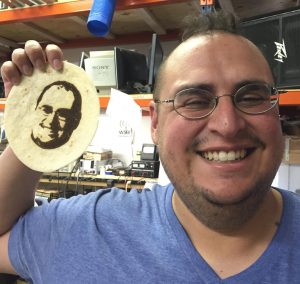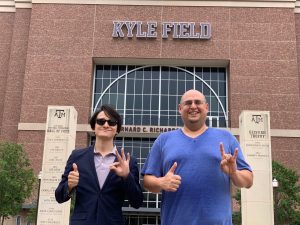Turning Passion Into Pedagogy
The department of communication media lab director prefers 'joey lopez phd' for all references to his name and title saying it allows him to 'depower' his title so he can empower students. His multimedia and new media courses, which he describes as theme based rather than skill based, all share the same theme – passion.
By Madison Brown

Photo by Andrew Valdez.
For “joey lopez phd,” the harder academic test isn’t writing down known answers to questions; it’s the more challenging process of empowering students to test themselves and define their personal passion. For Lopez, the next step is guiding students in how to pair that passion with new skills to create content that truly matters.
The associate professor’s preference for an all-lowercase presentation of his name and title is just another part of his pedagogy. In the same way he said he prefers the “depowering” of his name and title, he describes his teaching as “facilitative” rather than “dictative.” As media lab director for the department of communication, Lopez said his multimedia and new media courses are theme based rather than skill based, and the theme is the same for all – passion.
“Instead of saying that you need to do this project, this way, following this rubric, and turn it in at this time, with this file name, and this format, I’m more like ‘What is a project?’” explained Lopez. “Go make it, document it and turn it in. And we will watch it and see what everybody comes up with.”
He acknowledges this is not the standard approach among college professors. Specifically, looking back, Lopez said he sometimes felt his teachers weren’t looking out for his personal interests as much as trying to emulate what they thought would bring success to mass amounts of people.
“I take the totem pole of academia and try to put it on its side,” said Lopez. “I want to work with students, professors, graduate students … and build out this idea of new media and creating things that matter to you, because that is how rich content is made.”
Creating multimedia requires mastering certain skills, but in Lopez’ classes, the first skill students acquire is how to identify individual passion. Just as he wants to depower the presentation of his name, Lopez said he wants to empower students to pursue whatever is important to them.

Natives of San Antonio, professor Joey Lopez and lecturer Jonathan Guajardo both teach multimedia in the Department of Communication.
“When I am teaching in the classroom, I am not worried about your background,” said Lopez. “I am not worried about who you are.
“My assumption is that everybody is a genius in their own way, and my job as a teacher is to figure that way out,” Lopez explained.
By allowing students self-expression, they go on to create a diverse and inclusive group of work, said Lopez.
“I just looked at college and said ‘These students are spending so much money, I mean SO much money, on their education,’” said Lopez. “We need to facilitate their dreams.”
Lopez’ passion is helping people. As a professor, Lopez said he can help his students learn skills and theory, mix it with what they are passionate about, and then they go create new things.
“It sounds very simplistic, but that model has been very, very, very successful and I’ve been doing it for around 15 years now,” said Lopez. “I have seen students become stunt people. I have had students on Shark Tank. I have had students become teachers and everything else.
Students have been able to achieve goals after learning to create in a way that is meaningful to their personal passion, he said.
“It is always amazing to get to be that catalyst for them to kind of revolutionize or rebel,” said Lopez. “Not from responsibility – but what they thought responsibility was – and to come to terms with what it is for them.”
Lopez’ advice to anyone working to define a personal passion is simple.
“Through having to think about what you are interested in, through having to figure out these skills – and being honest with yourself and saying, ‘What am I passionate about?’ – that’s how you find your passion,” said Lopez.
“It is very simple sounding, but when you get into the details of it, you realize [it] is much harder than taking a test that has known answers,” said Lopez.
- Dept News
- Faculty
- In the Department
- Andrew Valdez
- Associate Professor
- COMM
- Communication Skills
- communications
- Department of Communication
- Dr. Joey Lopez
- Faculty
- joey lopez
- Joey Lopez A&M
- Joey Lopez Media
- Jonathan Guajardo
- Lecturer Texas A&M
- Lopez A&M
- Madison Brown
- Media Lab
- Multimedia
- New media
- Pedagogy
- Professor of Communications
- San Antonio
- TAMU COMM Department
- tamu communications
- Texas A&M
- Texas A&M Communications
- Texas A&M Department of Communications
- Texas A&M Media
- Texas A&M Professor
- Texas A&M University
